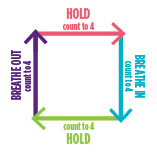Helpful tools for behaviour change
Our clinicians use a variety of tools in every programme to help clients make lifelong behaviour change. We know clients who take these tools and keep them close long after they have left RISE, referring to them as they move through the ongoing process of change. Whether it is a breathing exercise that will keep you calm in a stressful moment or a scale to help you identify how angry you are getting, these tools will help you manage your emotions in a healthy way.
Breathing exercises
Try one or all of these exercises to slow your breathing and achieve a calmer state.
Deep breathing exercise
Taking a deep breath calms you down by triggering neurons in your brain that tell the body it’s time to relax. Deep breathing increases the supply of oxygen to your brain and stimulates the parasympathetic nervous system, which promotes a state of calmness.
Follow these steps for a quick return to calm:
Breath IN through the nose for 4 seconds.
HOLD your breath for 4 seconds.
Breathe OUT through the mouth for 4 seconds.
HOLD your breath for 4 seconds.
REPEAT 4 times.
Take 5 breath
Within five breaths, you can completely change your mental, physical, or emotional state. Follow the Take 5 breath exercise to increase calm, clarity, and focus.
1-10 Scale
Know what level you are at in the moment with RISE’s 1-10 Scale.
Be aware of your emotions and behaviours. Once you know, you can act.
Take a time out at 5 or earlier.
Download a PDF version of this poster to keep at home.
Click here for a version to keep on your phone.
Below, Dr Victor MacGill talks you through the 1-10 Scale.
Keeping confidential information
Unless it is a matter of safety to you or someone else, information you share with RISE Clinician/s is confidential and will not be shared. This includes the names of any members of your whānau or people known to you who may also be accessing RISE services. Likewise, you will not receive information regarding anyone else, including any members of your whānau, receiving support from our services.





